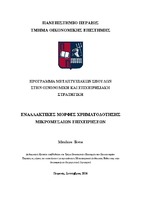Εναλλακτικές μορφές χρηματοδότησης μικρομεσαίων επιχειρήσεων
Alternative funding sources for SMEs

Προβολή/
Λέξεις κλειδιά
Μικρομεσαίες επιχειρήσεις ; Χρηματοδότηση ; Εναλλακτικές μορφές χρηματοδότησης ; ΜΜΕ ; Small businesses ; SMEs ; Funding of SME ; Alternative funding sourcesΠερίληψη
Η παρούσα διπλωματική εργασία πραγματεύεται το θέμα της χρηματοδότησης των μικρομεσαίων επιχειρήσεων μέσω εναλλακτικών πηγών χρηματοδότησης. Επιχειρείται μια αναζήτηση και σύντομη παρουσίαση των διάφορων εναλλακτικών μορφών χρηματοδότησης που υπάρχουν και εφαρμόζονται εδώ και αρκετά χρόνια, καθώς και των νέων εναλλακτικών μορφών που έχουν αναπτυχθεί τα τελευταία χρόνια, λόγω της γενικότερης κατάστασης που επικρατεί στο θέμα της πρόσβασης των ΜΜΕ στα αναγκαία κεφάλαια και των δυσκολιών που αντιμετωπίζουν λόγω της οικονομικής κρίσης. Το πρώτο κεφάλαιο της εργασίας αποτελεί μια γενική αναφορά στις μικρομεσαίες επιχειρήσεις. Αναφέρεται ο ορισμός των ΜΜΕ σύμφωνα με την Ευρωπαϊκή Επιτροπή, τα χαρακτηριστικά που παρουσιάζουν οι ΜΜΕ και η συμβολή τους στην ελληνική οικονομία. Στη συνέχεια, το δεύτερο κεφάλαιο, αποτελεί μια γενική εισαγωγή στο θέμα που πραγματεύεται η εργασία, παρουσιάζοντας τα είδη των χρηματοδοτήσεων και τις ανάγκες και τους λόγους που μια μικρομεσαία επιχείρηση αναζητάει χρηματοδότηση. Μετά ακολουθεί το κυρίως μέρος της εργασίας το οποίο αποτελείται από το κεφάλαιο 3 και 4, όπου αναλύονται οι εναλλακτικές μορφές χρηματοδότησης των ΜΜΕ. Στο τρίτο κεφάλαιο γίνεται αναφορά στις μορφές χρηματοδότησης οι οποίες δραστηριοποιούνται τις τελευταίες δεκαετίες και παρουσιάζουν όλο και μεγαλύτερη ανάπτυξη και προτίμηση από τις ΜΜΕ, παρουσιάζονται τα είδη που εμφανίζονται αυτές οι εναλλακτικές μορφές, τα χαρακτηριστικά τους, τα πλεονεκτήματα και μειονεκτήματα που έχει η κάθε μορφή, καθώς γίνεται και μια ενδεικτική αναφορά σε κάποιες εταιρείες ή προγράμματα που παρέχουν αυτές τις εναλλακτικές μεθόδους στην Ελλάδα. Ενώ στο τέταρτο κεφάλαιο παρουσιάζονται οι νέες εναλλακτικές μορφές χρηματοδότησης που έχουν δημιουργηθεί και αναπτυχθεί μόλις τα τελευταία χρόνια και παρουσιάζουν μεγάλο ενδιαφέρον σε παγκόσμιο επίπεδο. Περιγράφεται η μορφή που συναντάται η κάθε νέα εναλλακτική πηγή άντλησης κεφαλαίων και η
διαδικασία που λειτουργεί και προσφέρει χρηματοδότηση προς τις ΜΜΕ και, επίσης, παρουσιάζονται τα πλεονεκτήματα και μειονεκτήματα της κάθε μορφής. Τέλος, στο τελευταίο κεφάλαιο ακολουθεί το εμπειρικό κομμάτι της εργασίας, όπου παρουσιάζονται τα αποτελέσματα της δειγματοληπτικής έρευνας που πραγματοποιήθηκε μέσω ερωτηματολογίου με σκοπό τη διερεύνηση πόσο ενήμεροι είναι οι Έλληνες επιχειρηματίες για την ύπαρξη και τη χρησιμότητα των εναλλακτικών πηγών χρηματοδότησης, αν έχουν χρησιμοποιήσει κάποια εναλλακτική μορφή και πόσο θετικοί εμφανίζονται στο να αναζητήσουν χρηματοδότηση μέσω κάποιας εναλλακτικής πηγής στο μέλλον.


